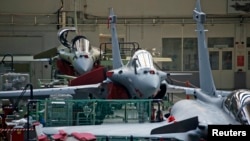French Defense Minister Jean-Yves Le Drian is due in Cairo Monday to sign off on a $5.9 billion purchase by Egypt of 24 French Rafale fighter jets and a frigate. The deal boosts France's struggling economy and helps bolster Egypt's military arsenal in the face of rising insecurity. Some are questioning why France is going ahead with the sale to a country with a poor human rights record.
After years of trying to sell its Rafale fighter jets overseas, France finally has some good news.
In announcing Egypt's agreement to purchase two dozen of the aircraft, French President Francois Hollande said Cairo wanted a quality air force and a quick deal…and it got both. He said Egypt wanted the planes quickly because of threats surrounding the country.
Those threats include turmoil in neighboring Libya but also Islamist terrorism in the Middle East and North Africa.
The sale gives the French defense industry a boost after Paris was forced to put on hold the sale of two warships to Russia, amid the standoff over Ukraine. It also comes at a time when the government is cutting defense spending.
Paris correspondent for Defense News said France is cutting down on buiying the jets.
"The French government is committed to cutting down the domestic orders of the Rafale. To make up for the cut, France needs to find export customers for the Rafale. So Egypt is the first export customer - yes, indeed, that's important, that's significant. But for jobs and the economy, this is very important."
That's especially important for Dassault Aviation, which manufactures the fighter jets.
"We're very proud," Dassault's head Eric Trappier told French radio. He said the Egyptian army has seen the jets in operation and they're satisfied with their performance.
Egypt's "alarming" human rights abuses
But not everybody is pleased.
Emmanuelle Cosse, who heads the EELV greens party, says the Rafale sale is great for France's accounts and for Dassault. But in an interview on France Info radio, she asked if selling the planes to Egypt is a good idea, given the country's economic and social difficulties. And after Egyptian police have fired on peaceful protesters.
Amnesty International also criticized the sale to a country with what it calls "alarming" human rights abuses.
Aymeric Elluin, who heads the arms and impunity campaign for Amnesty France, notes that France has ratified a new international Arms Trade Treaty, aimed at keeping weapons out of the hands of human rights abusers. Who's to say, he asked, whether Egypt - which hasn't signed the treaty - will use the French-made weapons in a lawful manner?
Some observers also suggest the sale marks an effort by Egypt to reduce its military dependance on the United States. Relations between Cairo and Washington have been strained since Egypt's military led by army chief Abdel Fattah el-Sissi deposed the coutry's first freely elected President Mohamed Morsi. Sissi has since been elected president.
Defense News correspondent Pierre Tran wondered why Cairo was on a rush to buy Rafale.
"The question is why (did Egypt) go to France so fast? And I would venture to point out that after this present government seized power..the US held up the delivery of four F16 (fighters) as a sign of disapproval…So perhaps going to buy French fighters, which cost a lot more - a great deal more, might be a sign to Washington," he said.
The U.S. State Department has downplayed the Rafale sale, saying Egypt is a sovereign country and Washington has its own security relationship with Cairo. But in France, questions about the Rafale sale are likely to linger long after the deal is signed.




